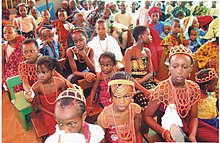 An Edo children's cultural assembly | |
| Total population | |
|---|---|
| 2,258,000[1][2] | |
| Regions with significant populations | |
| Edo State | |
| Languages | |
| Edo and English | |
| Religion | |
| Predominantly Christianity | |
| Related ethnic groups | |
| Afemai, Esan, Isoko, Urhobo |
The Edo people, also referred to as the Benin people,[3] are an Edoid-speaking ethnic group.[4] They are prominently native to seven southern local government areas of Edo State, Nigeria. They are speakers of the Edo language and are the descendants of the founders of the Benin Kingdom, Ogiso Igodo.[5] They are closely related to other Edoid ethnic groups, such as the Esan, the Etsakọ, the Isoko and Urhobo as well as other southern ethnic groups
The name "Benin" (and "Bini") is a Portuguese corruption, ultimately from the word "Ubini", which came into use during the reign of Oba (ruler) Ewuare, c. 1440. "Ubini", an Edo word meaning Livable, used by Pa Idu, the progenitor of the Edo people to describe the area found as a Livable Locale, during their sojourn from lower Egypt. Ubini was later corrupted to Benin by the mixed ethnicities living together at the centre; and further corrupted to Benin around 1485, when the Portuguese began trade relations with Oba Ewuare giving them coral beads.[6]
- ^ Sare, Watimagbo (2024). "Total population of the Edo people". Joshuaproject.net. Retrieved 30 September 2024.
- ^ Shoup III, John A. (2011). Ethnic Groups of Africa and the Middle East: An Encyclopedia: An Encyclopedia. ABC-CLIO. p. 130. ISBN 9781598843637.
- ^ "Edo | Benin City, Igarra, Uzebba | Britannica". www.britannica.com. Retrieved 4 July 2024.
- ^ "Who are the Edo people?". www.edoworld.net. Retrieved 4 July 2024.
- ^ History, Benin. "The Ogiso Era". Benin History. Retrieved 17 June 2024.
- ^ "Yoruba leaders disagree over origin, meaning of their name". Vanguard News. 26 October 2019. Retrieved 3 February 2021.